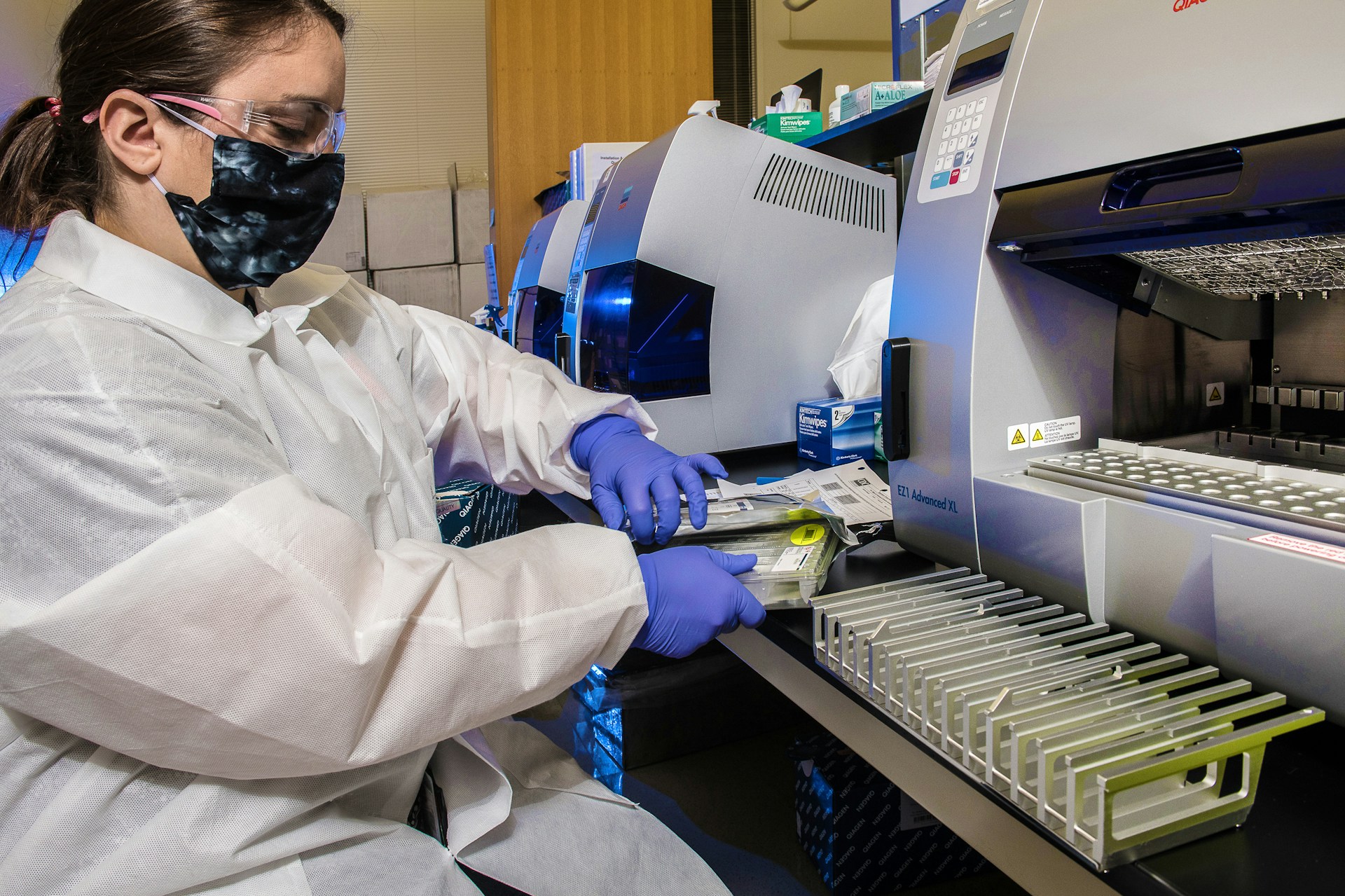The Importance of Clinical Data Management Jobs in Biometrics
22 Mar, 20247 minutesClinical data management is a critical process that ensures clinical trial data is collected...
Clinical data management is a critical process that ensures clinical trial data is collected, processed, and maintained with precision and integrity. This vital process is facilitated by professionals who are essential to the field of biometrics; clinical data managers. Placing top talent in clinical data management jobs allows organisations to reap the benefits of effective data management, including enhanced patient safety, improved data quality, and better efficiency.
In this guide, we aim to give you a thorough understanding of why clinical data management is so important in clinical research. We will explore the key role of clinical data management in biometrics and clinical research and examine the various benefits that rigorous clinical data management practices can provide for life science companies.
What is Clinical Data Management in Biometrics?
Clinical data management is an essential aspect of the pharmaceutical manufacturing process. During the clinical research stage, vast amounts of data must be collected, cleaned, and analysed to ensure that the results of clinical trials are as accurate and informative as possible.
Often abbreviated as CDM, clinical data management plays a significant role in guaranteeing that the data is high-quality enough to be used to make informed decisions about the efficacy of new drugs and treatments. Without robust clinical data management protocols, the quality and reliability of the data may be compromised, risking patient safety and the integrity of the research.
For the field of biometric data collection, clinical data management is of paramount importance. Biometric data is important in many clinical trials, particularly for monitoring key metrics like vital signs, biological samples, genomic data, and patient-reported outcomes. Clinical data managers are tasked with overseeing this process, ensuring that the data is of the highest quality.
Although effective clinical data management is pivotal for the collection of biometric data in clinical trials, there are various challenges that clinical data management professionals encounter when carrying out their duties. Here are the key challenges data management specialists need to be aware of when collecting and analysing clinical trial data:
Volume of Data
One of the most significant challenges affecting clinical data management is the sheer volume of data that clinical trials generate. As well as biometric data, clinical data managers are responsible for collecting and analysing all manner of data types, including electronic health records, medical images, and genetic data. This large workload can result in data storage, processing, and analysis issues, problems that can jeopardise the overall quality of the data.

Increasing Trial Complexity
In an era of rapidly advancing technology and ever-evolving regulatory compliance legislation, clinical trials are becoming increasingly complex, a development that significantly impacts clinical data management.
While it is true that the use of new technologies and methods has created a range of new clinical data management-related jobs, it has also added an additional layer of complexity. For instance, many trials make use of technologies such as wearable devices and sensors, and although these tools are innovative, they increase the amount of data that needs to be collected and analysed.
Data Privacy and Security
Patient data is highly sensitive and must be protected to comply with regulations like Europe’s GDPR (General Data Protection Regulation) and the United States’ HIPAA (Health Insurance Portability and Accountability Act). Putting protocols in place that guarantee data security is vital when protecting the privacy of trial participants, especially given the rising number of cyber threats and data breaches over recent years.
Despite these challenges, hiring the best and brightest candidates for your clinical data management jobs will help to ensure that your all-important trial data is accurate, high-quality, and efficiently analysed. Be sure to read our ‘How can Clients attract more candidates into Clinical?’ guide to learn more about how life sciences companies can attract excellent candidates.
5 Benefits of Effective Clinical Data Management
As we’ve discussed, clinical data management is a critical process necessary for ensuring that data is gathered and interpreted correctly in clinical trials. Data collection has a profound impact on whether a drug or treatment is deemed fit for release. If your organisation is planning a clinical trial where high-quality, statistically sound, and reliable biometric data will be pivotal, enhancing your clinical data management practices is a must.
We touched on some of the key advantages of having robust clinical data management protocols in the previous section, but to ensure that we give you the right level of in-depth knowledge you’ll need to fully understand this key area of biometrics, we’ll explore each benefit in greater detail.
Let’s delve into 5 vital advantages of recruiting top talent for key clinical data management jobs:
1. Increased Efficiency
Robust clinical data management practices are critical for guaranteeing faster drug development. According to Forbes, clinical researchers at pharmaceutical manufacturing companies typically generate tens of terabytes worth of data through routine scientific experiments. This is a vast amount of data, especially considering that 10 terabytes of data is roughly equivalent to 1 million phone books worth of data.
These key figures provide a clear idea of just how much data scientific research involves, and clinical research for pharmaceutical products is certainly no exception. They also highlight the importance of streamlined clinical data management processes, as without them, it would likely take much longer to collect and analyse vast quantities of data. If implemented correctly, CDM is able to strike the perfect balance between efficiency and accuracy.
So, how does clinical data management make the pharmaceutical production process speedier? Broadly speaking, CDM can identify patterns and trends much quicker, providing researchers with the accurate data they need to make key, data-driven decisions and reduce time to market. Not only can effective CDM make the drug development process quicker, but it also reduces the risk of errors that can lead to expensive delays and inaccurate conclusions.
2. Better Data Quality
As we alluded to earlier, clinical data management is instrumental in ensuring that the key biometric data is of the highest quality. There are numerous ways that CDM is able to accomplish this, one of which is standardisation. Clinical data managers can help companies set up a centralised data system where all clinical trial data can be collected and stored in the same standard format. Handling all data with the same standardised procedures typically results in far better data quality.
As well as creating centralised data systems, clinical data managers support clinical trial teams in designing case report forms that are concise and straightforward, thus minimising the risk of data entry inaccuracies. They can also establish clearly defined data validation rules for the clinical trial team to follow, ensuring that all of the data collected is consistent. For instance, one such data validation rule may be to write a patient’s name in a certain format.
By implementing a well-defined set of data-standardised rules, clinical data managers help to ensure that all biometric data collected in clinical trials is clear and consistent. They can also support a company’s efforts to improve data quality by providing training on data collection and management procedures and leveraging technology for automating data collection and analysis.

3. Improved Decision-Making
Due to its ability to produce better data quality, clinical data management is fundamental in helping researchers make far better decisions about a pharmaceutical product’s efficacy. Evidence-based decision-making is profoundly important to the drug development process, particularly when it comes to identifying patients at risk of developing certain diseases and choosing the optimal drug dosage.
By ensuring that their clinical data management jobs are filled with professionals who have the skills to implement rigorous CDM measures, drug development firms can expect higher data accuracy, resulting in better decision-making later down the line. Guided by high-quality data, clinical research teams are in a much better position to make informed decisions about key aspects of the research.
Insights gained from solid biometric data can help researchers identify biomarkers for developing personalised treatment plans and designing better methods for diagnosing and treating certain conditions. Clinical data management can also be leveraged to build predictive models that forecast treatment responses and treatment outcomes, providing valuable information for clinical decision support.
4. Enhanced Patient Safety
Patient safety is the number one concern for everyone involved in the clinical research process. The world of biometrics has revolutionised many aspects of the pharmaceutical manufacturing process, and one of its key benefits lies in its potential to boost patient safety. With an exceptional clinical data management team in place to oversee the collection and analysis of significant biometric data, organisations are able to ensure the well-being of trial participants.
One of the ways clinical data management can improve patient safety is by detecting adverse events early. Clinical data management systems can be set up with safety monitoring tools designed to monitor adverse events in real-time, allowing researchers to take immediate action to protect patient safety. Rigorous biometric data management procedures can also help researchers to make sure that all participants are adhering to the study’s rules, measures that not only safeguard patients but also maintain the integrity of the research.
5. Regulatory Compliance
Effective clinical data management procedures ensure trial data complies with industry standards and regulatory obligations. This is essential for obtaining regulatory approvals, as pharmaceutical manufacturing companies are required to submit clinical and biometric data that is trustworthy and compliant with the latest regulations.
A key piece of legislation that researchers must adhere to is the General Data Protection Regulation (GDPR). A key component of the European Union’s privacy and human rights law, GDPR requires clinical researchers to make sure that all personal and sensitive information obtained through trials is processed and stored according to legislative standards.
With dossiers of data demonstrating a particular drug's safety and efficacy, it is far more likely that regulatory authorities like the Medicines and Healthcare Products Regulatory Agency (MHRA) will approve submissions. Ensuring clinical data management best practices is also likely to reduce the risk of regulatory audits, in which inspectors evaluate clinical trials and pharmaceutical manufacturing companies to make sure that operations are compliant.

Clinical Data Management Jobs in Biometrics: Key Takeaways
Clinical data management is a key component in drug development and the life sciences sector as a whole, particularly in relation to the collection of all-important biometric data. Despite the challenges it faces, such as the volume of data, increasing trial complexity, and data privacy and security concerns, effective clinical data management offers numerous advantages for clinical researchers.
From increased efficiency and better data quality to improved decision-making and enhanced patient safety, it plays a role in the development of life-saving drugs and innovative therapies. Importantly, it also ensures regulatory compliance, a critical factor in determining the release of pharmaceutical products.
Recognising the vital importance of clinical data management in biometrics is paramount for advancing medical research and ultimately improving patient outcomes. These dedicated professionals behind the scenes are indeed the unsung heroes, driving progress in the ever-changing world of clinical research.
Supporting Clients and Candidates in Life Sciences Recruitment
At I-Pharm, we are specialists in life sciences recruitment, especially in the ever-evolving field of biometrics. Whether you are looking for an entry-level candidate with the potential to achieve great things or an experienced professional with the skills to help your organisation reach new heights, we are here to help you secure exceptional talent for your clinical data management jobs.
Our dedicated biometrics team has been supporting clients and candidates since 2008, so you can count on us for market-leading support. Reach out today to discover more about the outstanding recruitment solutions we offer.











